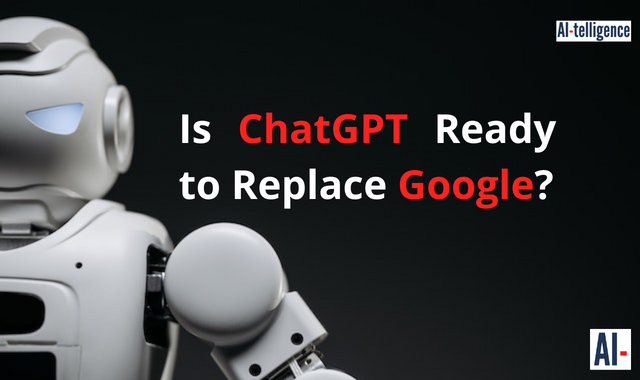Is ChatGPT Ready to Replace Google? A Look at the Limits and Benefits of Both
 Is ChatGPT Ready to Replace Google |
ChatGPT, a large language model trained by OpenAI, has made waves in the world of search engines. With its ability to process and generate natural language responses to a wide range of questions, it's being touted as the future of search. But is it really ready to replace Google? In this article, we'll take a closer look at the limits and benefits of both search engines, explore the differences between ChatGPT and Google as sources of verified information, and discuss how ChatGPT is impacting Google and Bing to evolve.
ChatGPT vs. Google: Limits and Benefits
One of the biggest benefits of ChatGPT is its ability to understand natural language queries. This means users can ask questions in a conversational tone and receive natural language responses that provide more context and nuance than traditional keyword-based searches. Additionally, ChatGPT is able to understand the intent behind a query, allowing it to provide more accurate results.
However, ChatGPT has its limits. It relies on pre-existing data to generate responses, which means it may not be able to provide up-to-date or complete information on certain topics. It also lacks the ability to browse the web, so it cannot provide direct links to relevant websites or resources.
Google, on the other hand, has the ability to crawl the web and provide direct links to relevant websites and resources. It also has an extensive knowledge graph that it uses to provide more complete and up-to-date information on a wide range of topics. However, it does have limitations when it comes to understanding natural language queries and providing context and nuance in its responses.
Verified Information: ChatGPT vs. Google
One area where ChatGPT and Google differ significantly is in their ability to provide verified information. Google has an extensive fact-checking system in place, and it prioritizes information from reputable sources in its search results. This means users can generally trust the information they find through Google.
ChatGPT, on the other hand, does not have a fact-checking system in place. While it can provide responses that are based on pre-existing data, there is no guarantee that the information is accurate or up-to-date. This is particularly concerning when it comes to sensitive topics like health and medicine, where inaccurate information can have serious consequences.
Impact on Google and Bing
Despite its limitations, ChatGPT is already having a significant impact on the search engine landscape. Google and Bing are both working to evolve their own search engines to compete with ChatGPT's natural language processing capabilities.
Google has already introduced features like "People Also Ask" and "Featured Snippets" that provide more context and nuance in its responses. It has also introduced Google Assistant, which is similar to ChatGPT in that it uses natural language processing to provide responses to queries.
Bing, meanwhile, is working on its own natural language processing capabilities. It recently introduced a feature called "Semantic Highlighting" that allows users to highlight specific parts of a search result and receive more detailed information.
Changing the Web and How People Search for Information
ChatGPT's impact goes beyond just the search engine landscape. It has the potential to change the way people search for information and interact with the web as a whole.
With its natural language processing capabilities, ChatGPT could make the web more accessible to people who struggle with traditional keyword-based searches. It could also make it easier for people to find the information they need quickly and easily, without having to wade through pages of search results.
However, there are concerns about the impact of ChatGPT on the spread of misinformation. As we mentioned earlier, ChatGPT does not have a fact-checking system in place, which means that it could inadvertently spread false information if it's not carefully monitored.
As with any technology, it's important to consider the potential drawbacks and challenges associated with ChatGPT. One of the biggest challenges will be ensuring that the information provided by ChatGPT is accurate and reliable. This will require ongoing monitoring and fact-checking to ensure that the responses provided are up-to-date and backed by credible sources.
Conclusion
In conclusion, while ChatGPT is an impressive technology that has the potential to revolutionize the search engine landscape, it's not quite ready to replace Google or any other search engine just yet. While its natural language processing capabilities are impressive, it's important to remember that ChatGPT has its limits, particularly when it comes to providing verified information.
Google and Bing are already evolving their own search engines to compete with ChatGPT's natural language processing capabilities, and it will be interesting to see how the technology continues to evolve in the coming years. Regardless of its future, it's clear that ChatGPT is already having a significant impact on the way we search for information and interact with the web, and it's exciting to see what the future holds for this impressive artificial intelligence.
As with any technology, it's important to consider the potential drawbacks and challenges associated with ChatGPT. One of the biggest challenges will be ensuring that the information provided by ChatGPT is accurate and reliable. This will require ongoing monitoring and fact-checking to ensure that the responses provided are up-to-date and backed by credible sources.
Another challenge will be addressing the potential bias that could be built into ChatGPT's responses. Like all machine learning algorithms, ChatGPT relies on the data it's trained on, and if that data is biased, the responses generated by ChatGPT could be as well. This is a concern that will need to be addressed as technology continues to evolve.

.png)
Comments
Post a Comment